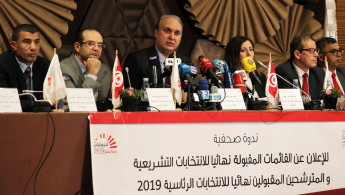Tunisia reveals final list of candidates for presidential election
Tunisia's electoral commission on Saturday announced a final list of 26 presidential candidates to stand in a September 15 poll to elect a successor to late leader Beji Caid Essebsi.
"There are 26 candidates for the 2019 presidential election," electoral commission (ISIE) head Nabil Baffoun told a press conference.
The poll was brought forward from November following Essebsi's death in July at the age of 92.
He had been elected in the wake of the 2011 revolt that overthrew former dictator Zine El Abidine Ben Ali.
Candidates to have been given the green light include Prime Minister Youssef Chahed, interim parliamentary speaker Abdelfattah Mourou and former defence minister Abdelkrim Zbidi.
They also include media magnate Nabil Karoui, despite his arrest on August 23 for alleged money laundering.
According to Baffoun, even convicted candidates can take part as long as the verdict against them does not specifically say they are banned from running in an election.
Karoui had been charged with money laundering in early July shortly after stating his intention to stand in the polls, but has remained a leading candidate.
The final list includes only two women -- former tourism minister Salma Elloumi and Abir Moussi, who heads a group formed from the remnants of Ben Ali's ruling party.
Campaigning began Saturday abroad and will run from September 2 to 13 in Tunisia.
Some 1.2 million Tunisians live overseas, mainly in Europe.
The prime minister launched his overseas campaign in the French city of Lyon on Saturday, where he cast himself as a human rights defender.
"We hope to speak with Tunisians to explain to them... our vision for a stronger Tunisia, a more modern and developed Tunisia, and a Tunisia that truly believes in the universal values of human rights," he told AFP ahead of a campaign meeting.
Tunisia has been praised as an example of successful democratic transition after the Arab Spring uprisings.
But it has struggled with repeated attacks by Islamist extremists, along with inflation and unemployment that have hit Chahed's popularity.
Read more: Tunisia’s fragile democracy after Essebsi





 Follow the Middle East's top stories in English at The New Arab on Google News
Follow the Middle East's top stories in English at The New Arab on Google News
![The UAE is widely suspected of arming the RSF militia [Getty]](/sites/default/files/styles/image_330x185/public/2024-11/GettyImages-472529908.jpg?h=69f2b9d0&itok=Yauw3YTG)
![Netanyahu furiously denounced the ICC [Getty]](/sites/default/files/styles/image_330x185/public/2024-11/GettyImages-2169352575.jpg?h=199d8c1f&itok=-vRiruf5)
![Both Hamas and the Palestinian Authority welcomed the ICC arrest warrants [Getty]](/sites/default/files/styles/image_330x185/public/2024-11/GettyImages-2178351173.jpg?h=199d8c1f&itok=TV858iVg)